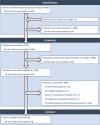How Information Affects Patients with Parkinson's Disease: A Scoping Review of the Literature
- PMID: 38995802
- PMCID: PMC11380222
- DOI: 10.3233/JPD-240073
How Information Affects Patients with Parkinson's Disease: A Scoping Review of the Literature
Abstract
Background: Patients with Parkinson's disease (PD) need to receive adequate information to manage their disease. However, little is known about how information provision affects patients.
Objective: To conduct a scoping review of the literature on the relationship between content, timing, manner of delivery, and source of PD-specific information on the one hand, and patient outcomes on the other.
Methods: All literature reporting about original data and published until April 2024 in peer-reviewed journals was searched in MEDLINE (Ovid), Embase (Ovid) and PsychInfo (Ovid). Subsequently, data were extracted and synthesized.
Results: 40 publications describing the effects of information provision or patients' evaluation thereof were retrieved. Four categories of patient outcomes were described, namely 1) evaluation and experience of information provision; 2) physical functioning; 3) psychosocial well-being; and 4) quality of life. In intervention studies, patients generally valued the provided information. Findings from cross-sectional and qualitative studies showed the importance of tailoring information to individuals' needs and capabilities. Due to variation in study designs and outcomes, no unambiguous conclusions could be drawn regarding the relationship between information and outcomes.
Conclusions: This scoping review identified how PD patients acquire information and revealed a lack of systematic research into the effect of information on patient outcomes. Future studies should assess 1) what information is currently provided by clinicians; 2) what additional information might be beneficial to provide; and 3) how information can be effectively aligned to benefit patients. This will eventually yield insight into how information might optimally empower PD patients.
Keywords: Parkinson’s disease; information sources; patient education; patient outcome.
Conflict of interest statement
Leonie Visser (LNCV) has been an invited speaker at Schwabe Group, fees were paid to her institution. Other authors have no conflict of interest to report.
References
-
- Phillips LJ (2006) Dropping the bomb: The experience of being diagnosed with Parkinson’s disease. Geriatr Nurs 27, 362–369. - PubMed
-
- Hoehn MM, Yahr MD (1967) Parkinsonism: Onset, progression, and mortality. Neurology 17, 427–427. - PubMed
-
- Lorig KR, Holman HR (2003) Self-management education: History, definition, outcomes, and mechanisms. Ann Behav Med 26, 1–7. - PubMed
-
- Kessler D, Liddy C (2017) Self-management support programs for persons with Parkinson’s disease: An integrative review. Patient Educ Couns 100, 1787–1795. - PubMed
Publication types
MeSH terms
LinkOut - more resources
Full Text Sources
Medical
Miscellaneous


